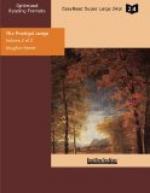Left alone, Hannibal gravely seated himself at the table. What the judge’s larder lacked in variety it more than made up for in quantity, and the boy was grateful for this fact. He was half famished, and the coarse, abundant food was of the sort to which he was accustomed. Presently he heard the judge’s heavy, shuffling step as he came up the path from the road, and a moment later his gross bulk of body filled the doorway. Breathing hard and perspiring, the judge entered the shanty, but his eagerness, together with his shortness of breath, kept him silent until he had established himself in his chair beside the table, with the jug and a cracked glass at his elbow. Then, bland and smiling, he turned toward his guest.
“Will you join me?” he asked.
“No, sir. Please, I’d rather not,” said Hannibal.
“Do you mean that you don’t like good liquor?” demanded the judge. “Not even with sugar and a dash of water?—say, now, don’t you like it that way, my boy?”
“I ain’t learned to like it no ways,” said Hannibal.
“You amaze me—well—well—the greater the joy to which you may reasonably aspire. The splendid possibilities of youth are yours. My tenderest regards, Hannibal!” and he nodded over the rim of the cracked glass his shaking hand had carried to his lips. Twice the glass was filled and emptied, and then again, his roving, watery eyes rested meditatively on the child, who sat very erect in his chair, with his brown hands crossed in his lap. “Personally, I can drink or not,” explained the judge. “But I hope I am too much a man of the world to indulge in any intemperate display of principle.” He proved the first clause of his proposition by again filling and emptying his glass. “Have you a father?” he asked suddenly. Hannibal shook his head. “A mother?” demanded the judge.
“They both of them done died years and years ago,” answered the boy. “I can’t tell you how long back it was, but I reckon I don’t know much about it. I must have been a small child.”
“Ho—a small child!” cried the judge, laughing. He cocked his head on one side and surveyed Hannibal Wayne Hazard with a glance of comic seriousness. “A small child and in God’s name what do you call yourself now? To hear you talk one would think you had dabbled your feet in the Flood!”
“I’m most ten,” said Hannibal, with dignity.
“I can well believe it,” responded the judge. “And with this weight of years, where did you come from and how did you get here?”
“From across the mountains.”
“Alone?”
“No, sir. Mr. Yancy fetched me—part way.” The boy’s voice broke when he spoke his Uncle Bob’s name, and his eyes swam with tears, but the judge did not notice this.
“And where are you going?”
“To West Tennessee.”
“Have you any friends there?”
“Yes, sir.”
“You’ve money enough to see you through?” and what the judge intended for a smile of fatherly affection became a leer of infinite cunning.




